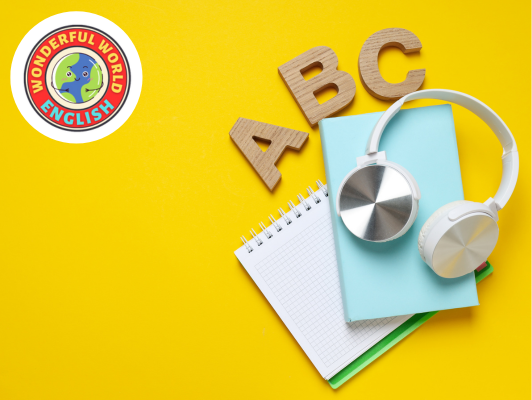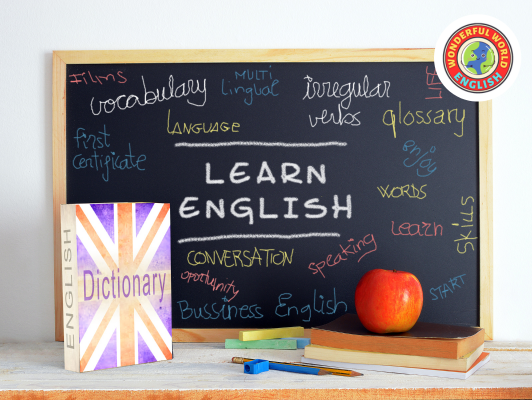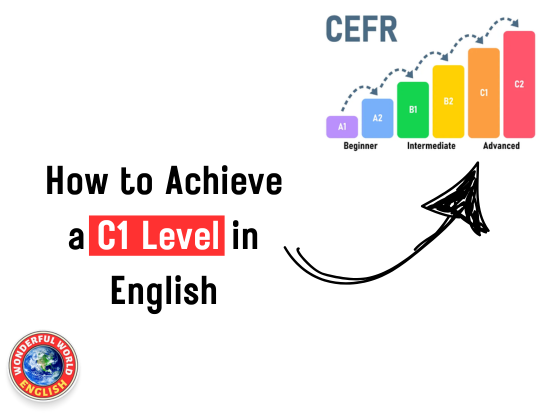Contents
Toggle
Meet David De’ Ath, founder, editor, and writer at Wonderful World English. With his extensive background as an English teacher, David provides valuable insights and practical tips on ESL for students and teachers alike.
Learning English, like any language, is a journey that varies greatly from person to person.
The time it takes can depend on numerous factors, including a learner’s native language, prior experience with other languages, exposure to English, the methods used for learning, and the individual’s time commitment.
Generally, language acquisition unfolds in stages, beginning with grasping the basics and phonetics and then moving on to more complex grammatical structures, vocabulary, and cultural nuances.
Notably, the Common European Framework of Reference for Languages (CEFR) categorizes language proficiency across several levels, from A1 for beginners to C2 for those who have mastered the language.
Reaching each consecutive level often requires increased study time and practice.
Formal studies suggest approximately 200 hours of study to progress from one CEFR level to the next, but this can vary.
Immersive learning experiences and consistent practice can significantly accelerate the process.
Ultimately, the path to fluency is unique, and consistent exposure, along with practical application, proves crucial in advancing English language skills.
Key Takeaways
- The time to learn English depends on individual circumstances and learning styles.
- Mastery occurs across distinct stages, from basic understanding to full proficiency.
- Consistent practice and immersion are key factors in accelerating language acquisition.
Fundamentals of English Language Acquisition
Mastering English involves understanding its complexities and levels, setting realistic goals, and adopting effective study strategies that resonate with the learner’s life stage and linguistic background.
Understanding Language Levels and Goals
When learners set out to study English, it’s crucial to identify their current English level and set a goal.
The Common European Framework of Reference for Languages (CEFR) provides a scale from A1 (beginner) to C2 (mastery) to measure proficiency.
For instance, reaching a B2 level indicates that the learner can engage in spontaneous conversations and understand the main ideas of complex text.
Importance of Age and Native Language
The age of language learners often impacts the speed and ease of acquiring English.
Adult learners may face more challenges than younger ones but can still achieve fluency with commitment.
Moreover, the learner’s native language plays a role; those whose first languages have significant differences from English, such as Arabic, Japanese, Chinese, or Korean, might need more time to achieve proficiency.
Designing Effective Study Schedules
An effective study schedule is paramount.
Allocating dedicated hours each day is more beneficial than sporadic study.
For busy individuals, short, consistent study sessions that fit into daily life are more sustainable and can still lead to successful language acquisition over time.
Choosing the Right Learning Materials
Books, textbooks, and supplementary materials such as videos with subtitles, audio, podcasts, and online programs are invaluable tools.
The right materials should match the learner’s level and include a variety of content to engage different language skills.
Incorporating Different Study Methods
Diversifying study methods is essential to language acquisition.
Practicing listening, speaking, reading, and writing helps in developing well-rounded language skills.
Interacting with native speakers through conversation lessons or even using language exchange platforms can significantly enhance the learning experience.

Developing Core English Skills
Acquiring proficiency in English requires a methodical approach to mastering its various facets, such as grammar, vocabulary, and the four key language skills: reading, writing, speaking, and listening.
Strategies for immersion and receiving guidance from tutors further solidify language fluency.
Mastering Grammar and Vocabulary
To communicate effectively in English, one must have a strong grasp of grammar and vocabulary.
This involves understanding grammar rules, which are the backbone of language structure, and expanding one’s repository of words and phrases.
Structured lessons and consistent practice turn these fundamentals into second nature.
- Grammar Rules: Comprehending syntax, tenses, and sentence structure.
- Vocabulary: Learning words and their meanings, as well as correct usage through thematic lists, flashcards, and contextual examples.
Bolstering Reading and Writing Proficiency
Reading and writing in English open up worlds of literature, science, and the arts.
Language learners enhance their reading and writing skills by engaging with diverse texts, practicing essay writing, and preparing for exams.
- Reading: Students should explore various genres, from articles to novels, to develop comprehension and vocabulary.
- Writing: Through exercises in spelling, composition, and text rewriting, individuals learn to convey complex ideas effectively.
Enhancing Speaking and Listening Abilities
Fluency in speaking and active listening are vital to participating in conversations and understanding spoken English.
Speaking practice helps with pronunciation while listening exercises improve the ability to parse spoken language.
- Speaking: Regular speaking practice, including pronunciation drills, leads to clear and confident verbal communication.
- Listening: Engaging with various audio materials hones the skill of understanding different accents and speech speeds.
Exploring Immersion and Tutor Guidance
Immersion in an English-speaking country facilitates rapid language acquisition.
Traveling or living in such a country provides daily opportunities to practice all language skills in real-world contexts.
Meanwhile, guidance from a tutor provides personalized feedback, accelerates learning, and addresses specific challenges.
- Immersion: Experiencing the language in its cultural context reinforces grammatical structures and colloquial usage.
- Tutor: A tutor gauges a learner’s proficiency and customizes lessons to target weak areas and bolster strengths.
Related: Cheapest English-Speaking Countries to Live in (Top 6)

Advancing to Full Proficiency and Beyond
Transitioning from upper intermediate levels to full proficiency in English requires commitment and strategies that go beyond basic language study.
It encompasses a combination of focused learning techniques, consistent progress tracking, and direct engagement with the language and its cultural intricacies.
Tackling Upper-Intermediate to Advanced Levels
Advanced language acquisition calls for approximately 700-800 hours at the C1 level and up to 1000-1200 hours for C2, which denotes mastery.
At these stages, English learners need to prioritize complex grammatical structures, nuanced vocabulary, and idiomatic expressions.
These levels are critical in shifting from fluent to a near-native command of the language, characterized by the ability to understand and articulate sophisticated ideas and abstract concepts.
Measuring Progress and Staying Motivated
Staying motivated across the lengthy journey to proficiency is often supported by setting clear targets and consistently measuring progress against the CEFR levels.
Regular self-assessment or formal proficiency exams can provide tangible benchmarks of improvement.
Success in language learning at this stage is heavily influenced by the learner’s dedication to study and their ability to remain motivated through various learning activities.
Cultural Immersion for Language Enrichment
Immersion in an English-speaking environment dramatically enhances language skills.
When individuals travel or reside in an English-speaking country, they are forced to use English in real-world situations.
This not only aids in grasping the subtleties of conversation but also exposes learners to the culture, which is intrinsic to language mastery.
Overcoming Language Plateaus
Upon reaching the advanced stages, learners often encounter plateaus where progress feels stagnant.
By diversifying their learning materials and activities, such as switching from textbooks to listening to various podcasts, they can challenge the brain in new ways and reignite progress.
Creative problem-solving and critical thinking exercises can also play a vital role in overcoming these plateaus.
Related: Best Podcasts to Learn the English Language in 2024 (Top 10)
Preparing for Proficiency Exams
For those who aim to certify their English level, preparing for internationally recognized exams like IELTS or TOEFL is essential.
It is vital to familiarize oneself with the test format and practice extensively.
A structured study plan that incorporates exam-specific strategies will increase the likelihood of success and reflect the true level of a language learner’s proficiency.
Interested in taking your English to the next level?
Why not Study English with Us!

Conclusion
Achieving fluency in English varies by the individual’s commitment and exposure to the language.
A person typically advances from one CEFR level to the next with approximately 200 hours of study.
However, learners should be aware that more advanced levels may require more hours.
For instance, reaching proficiency from a B1 level to a B2 can take between 350 to 400 hours.
Learners must have a clear goal and remain motivated throughout the process.
It’s emphasized that a solid plan, which includes a regular study schedule, considerable practice, and the use of various learning tools, is crucial to success in learning English.
For example, time estimates to achieve a B2 level might range from 600 to 850 hours, provided that the individual is engaged in consistent learning activities.
One’s background and the languages one speaks can influence one’s learning speed.
For speakers of languages vastly different from English, including Chinese or Arabic, the time to learn may increase by up to 50%.
It is essential to maintain realistic expectations alongside one’s dedication and practice.
Persistence and regular exposure to the language—in speaking, writing, listening, and reading—are fundamental to accelerating one’s progress and mastery of the English language.
We hope you find value in this information; you can contact us if you require any support.
Have a wonderful day!
Image Attribution: All images licensed via canva.com






